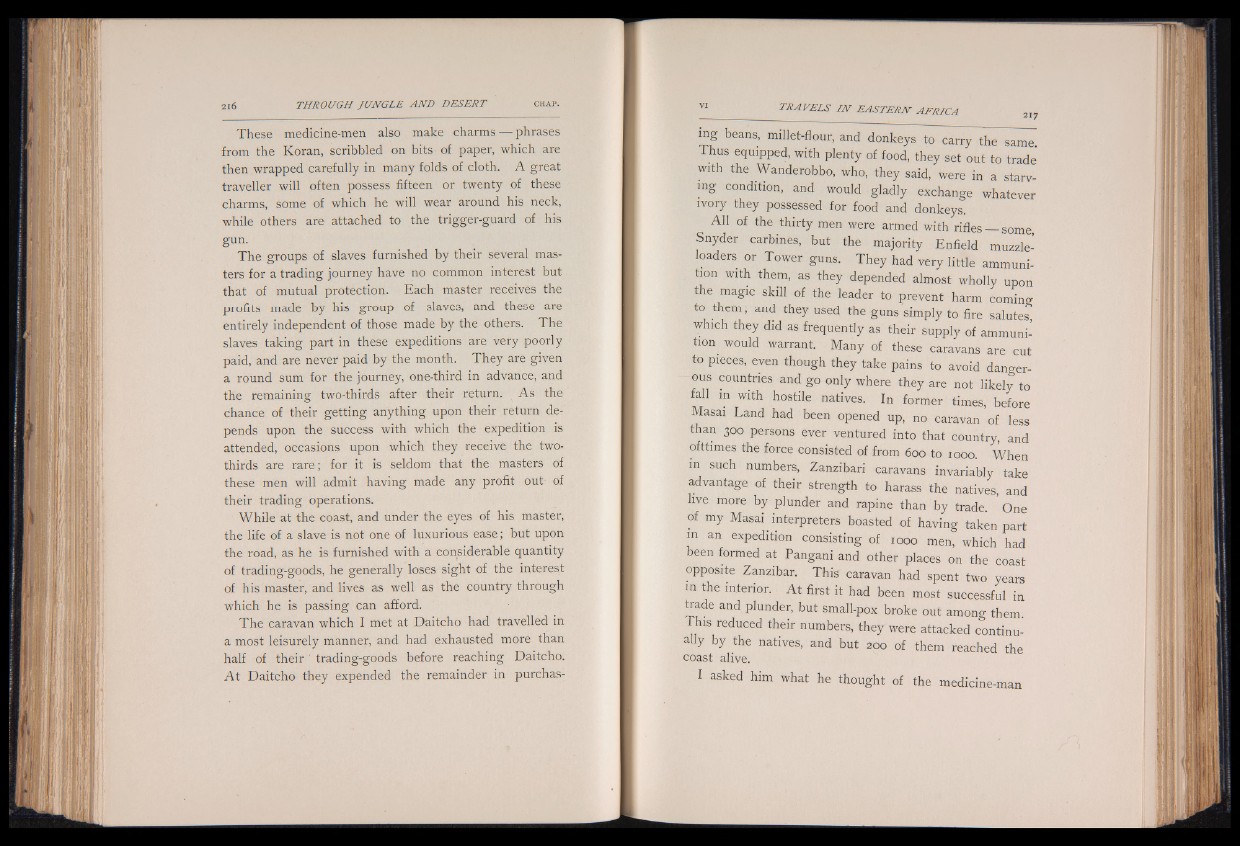
These medicine-men also make charms — phrases
from the Koran, scribbled on bits of paper, which are
then wrapped carefully in many folds of cloth. A great
traveller will often possess fifteen or twenty of these
charms, some of which he will wear around his neck,
while others are attached to the trigger-guard of his
gun.
The groups of slaves furnished by their several masters
for a trading journey have no common interest but
that of mutual protection. Each master receives the
profits made by his group of slaves, and these are
entirely independent of those made by the others. The
slaves taking part in these expeditions are very poorly
paid, and are never paid by the month. They are given
a round sum for the journey, one-third in advance, and
the remaining two-thirds after their return. As the
chance of their getting anything upon their return depends
upon the success with which the expedition is
attended, occasions upon which they receive the two-
thirds are rare; for it is seldom that the masters of
these men will admit having made any profit out' of
their trading operations.
While at the coast, and under the eyes of his master,
the life of a slave is not one of luxurious ease; but upon
the road, as he is furnished with a considerable quantity
of trading-goods, he generally loses sight of the interest
of his master, and lives as well as the country through
which he is passing can afford.
The caravan which I met at Daitcho had travelled in
a most leisurely manner, and had exhausted more than
half of th e ir ' trading-goods before reaching Daitcho.
A t Daitcho they expended the remainder in purchasing
beans, millet-dour, and donkeys to carry the same
Thus equipped, with plenty of food, they set out to trade
with the Wanderobbo, who, they said, were in a starving
condition, and would gladly exchange whatever
ivory they possessed for food and donkeys.
All of the thirty men were armed with rifles some
Snyder carbines, but the majority Enfield muzzle-
loaders or Tower guns. They had very little ammunition
with them, as they depended almost wholly upon
the magic skill of the leader to prevent harm coming
to them; and they used the guns simply to fire salutes,
which they did as frequently as their supply of ammunition
would warrant. Many of these caravans are cut
to pieces, even though they take pains to avoid dangerous
countries and go only where they are not likely to
fall in with hostile natives. In former times, before
Masai Land had been opened up, no caravan of less
than 300 persons ever ventured into that country, and
ofttimes the force consisted of from 600 to 1000. When
in such numbers, Zanzibari caravans invariably take
advantage of their strength to harass the natives, and
live more by plunder and rapine than by trade. One
of my Masai interpreters boasted of having taken part
in an expedition consisting of 1000 men, which had
been formed at Pangani and other places on the coast
opposite Zanzibar. This caravan had spent two years
in the interior. A t first it had been most successful in
trade and plunder, but small-pox broke out among them
This reduced their numbers, they were attacked continually
by the natives, and but 200 of them reached the
coast alive.
I asked him what he thought of the medicine-man